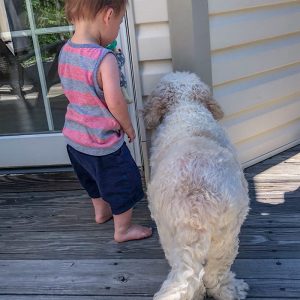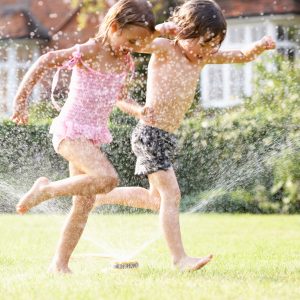
Guiding Children to Choose Love in a Negative World
From school shootings to deadly viruses and peaceful protests to violent riots, our world is going through a lot of change right now. As I watch the news in the morning, I am often overwhelmed with sadness and fear. Fear, not for myself, but rather for my children. It is petrifying to think of the world they will grow up in, the violence they will see, and the hate they will learn. I find myself desperately trying to find ways to teach kindness and love to my kids.
I not only lie awake at night worrying about the physical safety of my family, but I worry about the emotional development of my children as well.
So how do we preserve our children’s natural desire to love in a world with increasing amounts of intolerance and hate?
How to Teach Kindness and Love in a Violent World
I often feel helpless to the internet and all forms of media, which fuel more hatred and provide an easily accessible platform with ideas for turning that hate into vicious crimes. We live in a time of social media, where our children are exposed to scrutiny and criticism at an increasingly younger age and more than ever before. The opportunity for a child to be a victim of bullying or, even worse, become a bully to others has become easier and more rewarding. The news is filled with angry politicians and horrible hate crimes. Parents must begin to realize the power and responsibility we have to change the next generation.
We need to help give our children the right tools to choose love and to cope with hatred. So how can we help children understand and deal with hateful tragedies? And what can we do to teach our children love and tolerance?
1. Turn off the news when you are with your children.
I love to watch the news while getting my children ready for school or preparing dinner. Unfortunately, during times of tragedy, the news is filled with violent imagery and hateful language.
It is important to protect small children from exposure to this type of reporting.
Although they may not be able to fully process the information, images alone can provoke fear and feelings of sadness.
If they do see something that upsets them, make sure to refocus and show them images that illustrate human kindness to others. For example, a nurse helping a patient or citizens volunteering to help.
2. Be developmentally appropriate.
It is important to understand where your child is developmentally and answer their questions appropriately.
Don’t volunteer too much information. It may be overwhelming.
Instead, try to answer your child’s specific questions. Invite him or her to tell you anything they may have overheard at school or on the news and how it makes them feel.
3. Point out the good.
In every tragedy, there are dedicated and beautiful people sacrificing their own safety to help others. I have never felt so honored to be a part of the field of medicine and surrounded around people who are tirelessly working to help others. It give me peace to know there are so many more kind people in the world than evil ones.
It is important to highlight these acts of kindness to your children.
Of course, address the evil, but point out all the acts of bravery and sacrifice.
4. Incorporate acts of kindness into your daily routine.
Teach kindness and love with many and varied acts of kindness.
What is kindness anyway?
Well, when you hold a door open for someone, help an elderly person with their groceries, or donate food and supplies to the victims of hurricanes, you’re leading by example.
Use these opportunities as teaching moments and explain the importance of helping others.
Ask your children how it makes them feel. These moments are just as important as introducing your child to new foods or teaching them the alphabet. Teach lessons of hope and love and tolerance early on in your children’s development.
5. Promote independent thought, and build confidence.
With our children being exposed to bullying at a much younger age, it is important to build character traits that allow them to overcome criticism.
Help them to find their talents and foster those skills.
Whether music, sports, or theater, find activities that make them feel good about themselves and build confidence.
If your child is curious about social media, explain the downfall of those outlets. Make sure to talk about bullying ahead of time. Explain that they should feel comfortable coming to you with any negative feelings. Set ground rules for internet use and make sure your children know that you will be monitoring them.
If at any time your child is acting negatively towards another child, you need to sternly institute consequences and explain why these behaviors are hurtful.
6. Monitor, monitor, monitor.
It is hard as a busy parent to constantly monitor the electronic devices of our children, but it is imperative.
At times, there will be graphic videos and imagery on the internet. Make sure you are monitoring all of your children’s social media accounts, know their passwords, and keep close supervision on their online activity.
In addition to monitoring online presence and social media friendships, it’s a good idea to know who your children associate with in person. Social wellness and developing strong social skills, even in a world obsessed with the internet and social media, is important.
So help your children know the value of friendship and how important social and emotional health is to maintaining self worth.
7. Lead by example.
I encourage all parents to be role models for your children. They watch you, admire you, emulate you, adore you.
And they want to be like you.
You will mold them into the adults they will become and the parents they will be for their own children. The most important lesson you can teach them is to choose love!
Final Thoughts on Teaching Kindness and Love
All you need is love, right? Kindness for kids really is something so easy if we just show them the way from the beginning.
In spite of any negativity growing in the world, teaching our children to choose love is important.
So be kind. Teach kindness, love, and understanding. And together, we will make the world a better place for our children!





What an incredible, thought provoking article.
It reflects the loving and kind atmosphere you personally promote for your family and society…you are truly a blessing to all !